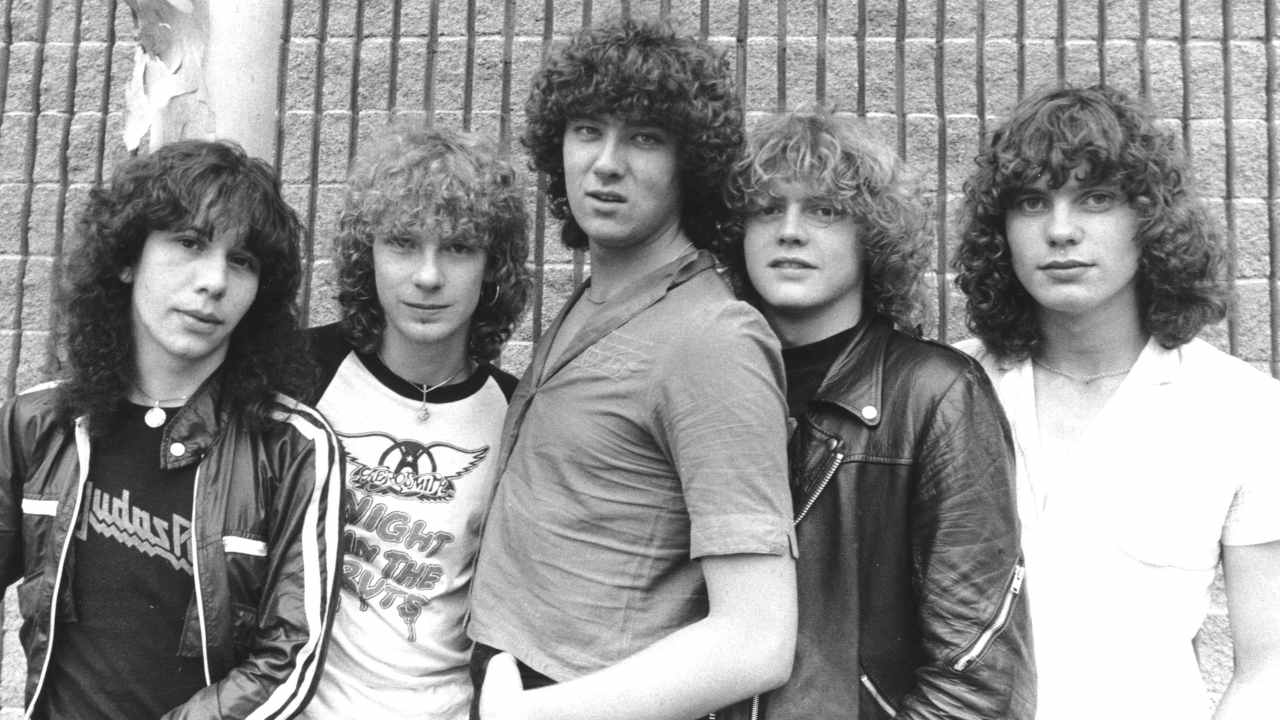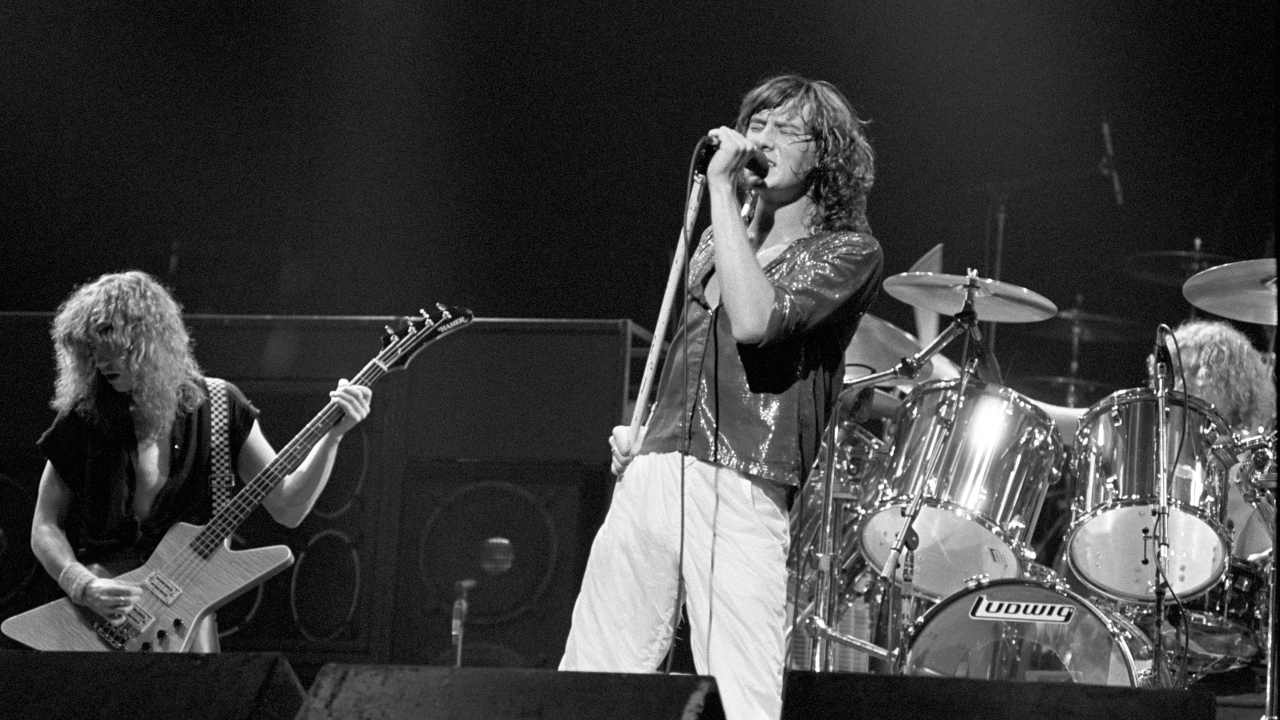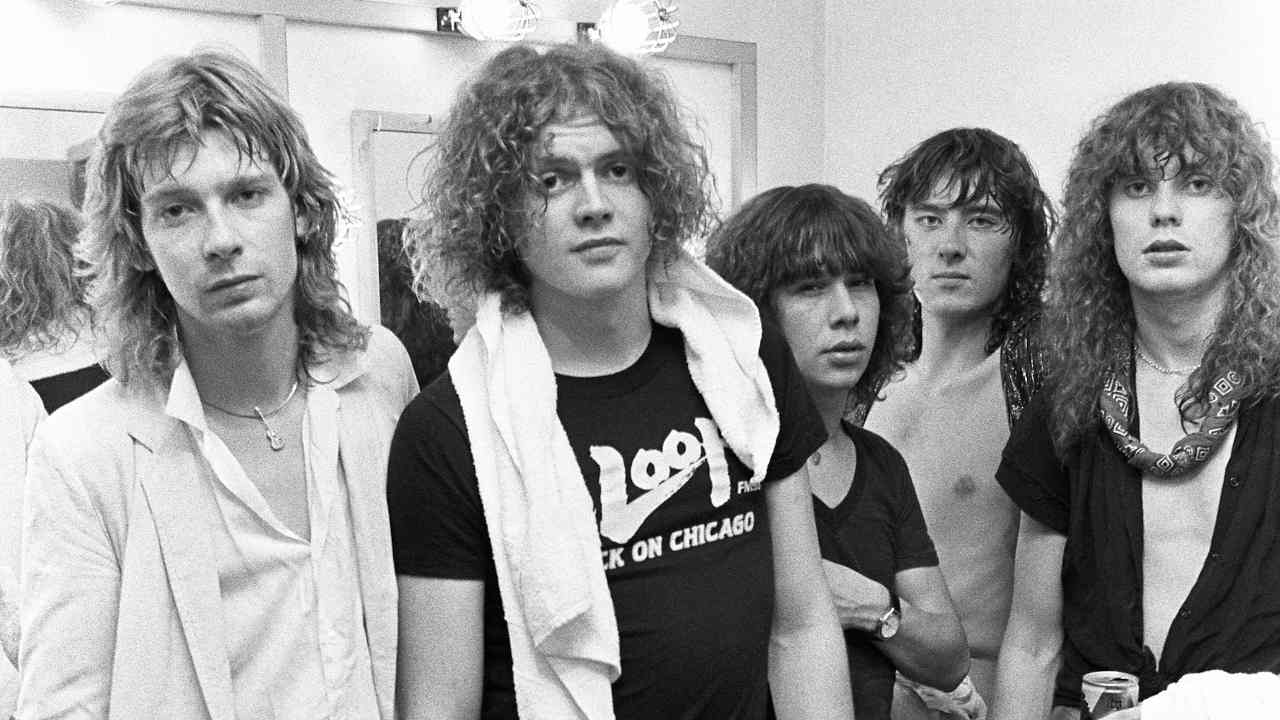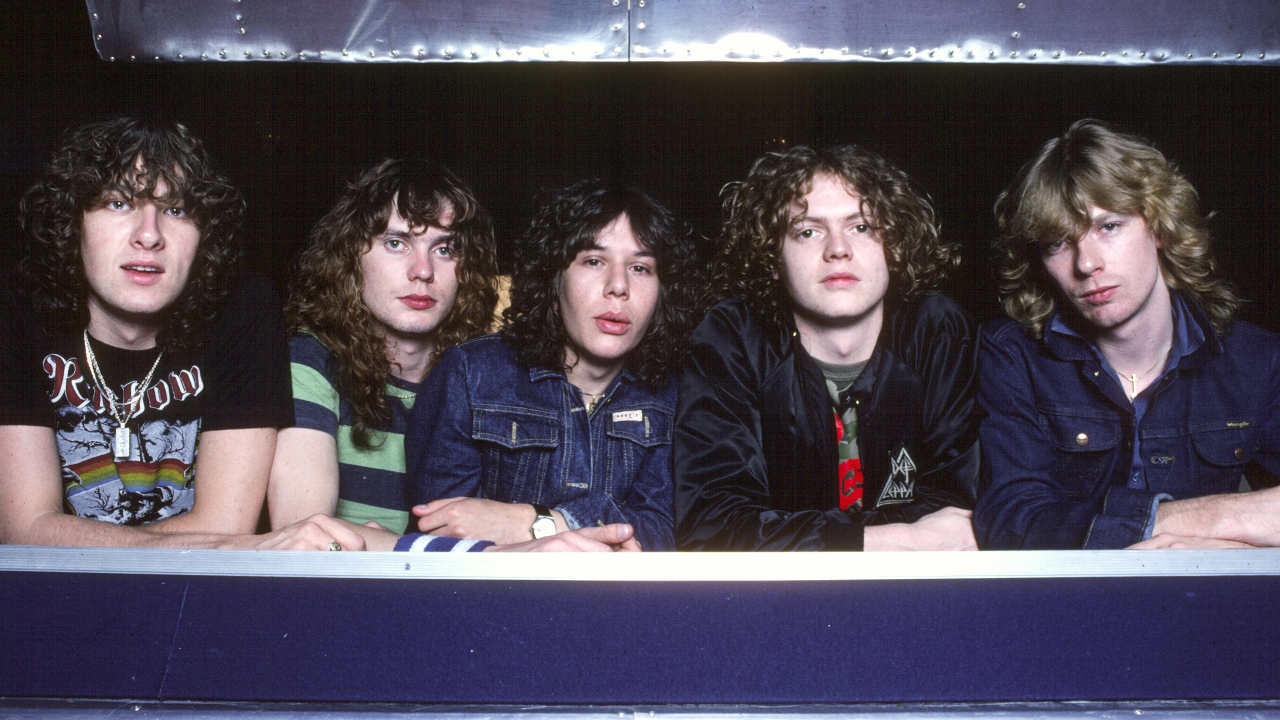1979 was a life-changing year for the five young members of Def Leppard. It began with the release of their debut record, The Def Leppard E.P. And before the year was out, the band had signed a major deal with Mercury/Vertigo, performed in 3000-capacity concert halls opening for Sammy Hagar and AC/DC, and made their first album, On Through The Night, in a mansion that was once home to John Lennon.
“It was insane,” singer Joe Elliott recalls. “Before we signed to Vertigo I was a working as a deliveryman for an ironmongery firm, driving a clapped-out old Ford Escort van. And when we made the album, I remember saying to my mates, ‘Can you believe that this is going to come out on the same label as Thin Lizzy?’”
The Def Leppard E.P. was the first small step on a long road that led to the band becoming one of the biggest in the world, and it was the singer’s father, Joe Elliott Sr, who gave them the £150 they needed to record it. “My dad literally emptied out his bank account,” Joe says. “That’s how much faith he had in his son, God bless him.”
In November 1978, a week before the band’s two-day session at Fairview Studios in Hull, original drummer Tony Kenning was fired. As bassist Rick Savage explains: “Tony didn’t fancy doing this as much as we did. So a decision had to be made.”
The next decision was to call in a friend, Frank Noon, drummer for The Next Band, a power trio formed in Lincolnshire but relocated to Leppard’s hometown of Sheffield. And after intensive rehearsals with Noon, the band arrived in Hull on a Friday night, checked into a cheap bed-and-breakfast joint, and promptly got pissed.

“We were pretty hungover on the Saturday morning,” Joe says. “But as soon as we started recording, all of a sudden we felt great again.”
Three songs were chosen for the E.P. “We wanted to show the different sides to the band,” Joe says. “So we picked Ride Into The Sun, a pop song, Getcha Rocks Off, a full-on rock song, and The Overture, which was this mad seven-minute epic.”
The backing tracks for Getcha Rocks Off and The Overture were both done in one take, and Joe’s vocals were recorded in the evening and on the following morning. After a quick tea break, the three songs were mixed, and at 3.45pm the band emerged from Fairview with copies of the three tracks on two cassette tapes. “The studio bill was £148.50,” Joe says, “so with the £1.50 in change we all bought a celebratory bag of fish and chips before we drove back to Sheffield.”
The very next day, Joe asked Frank Noon if he wanted to join Def Leppard. Out of loyalty to The Next Band, Frank declined, a decision he looked back on as “the biggest regret of my life”. Within a week, Rick Allen, having just turned 15, was installed as the new drummer. As Rick says, “Frank could quite easily have stepped into Def Leppard, but the planets lined up for me.”
The EP was a wholly independent release for which the band chose a tongue-in-cheek name as the record label – Bludgeon Riffola. The phrase had been used in a scathing review by Record Mirror of Leppard’s performance in September 1978 at The Limit, where they had opened for another rising group from Sheffield, electro-pop pioneers The Human League. Guitarist Pete Wills had remarked that ‘bludgeon riffola’ sounded like canned Italian food. The joke stuck.
The Def Leppard E.P. was released in January 1979, and within a week, all one thousand copies sold out. A second pressing of 1500 also sold fast. “We didn’t make any money out of it,” Joe says, “but as a promotional exercise you couldn’t beat it.”
This became apparent when Def Leppard had their first national radio airplay after Joe had ambushed John Peel, one of the most famous and respected DJs in the UK. “Peel did a Radio 1 event at Sheffield University one night,” Joe recalls. “I jumped on stage then gave him the E.P. and says, ‘I’m in this band – play it!’ The next day, around five in the afternoon, he called. He says, ‘I quite like it, so I’m going to play a song at half past seven tonight.’ I rang the other guys and just shouted down the phone: ‘Peel’s going to play us!’ I was sitting with my mum and dad when it happened – John Peel playing Ride Into The Sun on Radio 1. Amazing.”
All across Sheffield, in their separate homes, the other members of Def Leppard shared in the experience. “It was one of those moments when time stood still,” Rick Allen says. “I remember thinking, wow, this band is really something now.”
By the summer of ’79, as Def Leppard embarked on a UK club tour, several major record labels entered into a bidding war for the band’s signatures. “What we didn’t know at the time,” Joe says, “was that somehow a copy of the EP had ended up in Chicago on the desk of the head of A&R at Mercury records, Cliff Burnstein – and that Cliff had phoned his equivalent in the UK and says: ‘By no means let this band sign with any other label. Whatever it takes, sign them.’ The Americans wanted us so bad that they made sure we signed to the UK label, Vertigo.”
The deal was confirmed in August, a day after Joe Elliott, Rick Savage, Pete Willis and the band’s other guitarist, Steve Clark, attended a Led Zeppelin concert at Knebworth Park. Rick Allen, still legally a minor, had his parents sign the contract on his behalf. And once the deal was done, Cliff Burnstein quit his job at Mercury to co-manage Def Leppard with Peter Mensch, who, as manager of AC/DC, placed his new protégés as the opening act on the UK leg of AC/DC’s Highway To Hell tour, beginning in October 1979.
As Rick Savage described it, this tour was for Def Leppard a nightly rock’n’roll master class. “We saw how a seasoned headline act operated,” he says, “and how you interact with a big crowd. The standard of musicianship in AC/DC was unbelievable. We would watch in awe of how great they were.” And for Rick Allen, there was a memorable moment at London’s Hammersmith Odeon on November 1, when he celebrated his sixteenth birthday, and his tender age was reflected in the gift he received from Bon Scott, AC/DC’s famously hell-raising singer.
“Bon came in to our dressing room singing Happy Birthday in that strange Australian-Glaswegian voice, and gave me a big bowl of Smarties,” recalls Rick. “That was his funny way of showing me some love.”
In the first days of December – just three weeks after their last date with AC/DC – Def Leppard decamped to Tittenhurst Park, near Ascot in Berkshire, to record their debut album. The place was steeped in rock’n’roll history. It was where John Lennon, in the famous ‘white room’, was filmed singing Imagine with Yoko Ono at his side, and where, after John and Yoko had moved to New York City, another ex-Beatle, Ringo Starr, had taken up residence. “We were just soaking up that whole Beatles vibe,” Joe says. “And I drew the long straw and got Lennon’s bedroom.”
The producer for the album, ‘Colonel’ Tom Allom, was an old hand, experienced in working with heavyweight bands including Black Sabbath and Judas Priest. Allom was a bon viveur, giving the band an education on fine wines. “Every night, on the stroke of eight o’clock, there was much popping of corks,” recalls the singer.

The approach to the album was simple. As Joe explains: “We’d been playing most of the songs live for the best part of a year, and we just recorded them live.”
On the first day of recording, the band worked fast. “We got most of the backing tracks done in that one day,” Joe says. “Nine songs. It was easy.”
Leppard had a broad range of influences. Joe loved glam rock – Bowie, Bolan, Mott The Hoople. Steve was a Led Zeppelin fanatic. Pete was into UFO and Judas Priest. Rick Savage’s favourite band was Queen. Rick Allen’s was AC/DC. And all of this fed into the songs for On Through The Night.
“We wanted to sound like Queen, Lizzy, Mott, Slade,” Joe says. “Three-minute songs, with loads of guitars and big choruses – short and sweet and to the point, like glam rock was in the early ’70s and punk rock was in the late ’70s.”
The energy that Tom Allom captured was most evident on riff-heavy songs such as Wasted, Rock Brigade and the newly titled Rocks Off, minus the ‘Getcha’. “You can’t argue with the sheer raw power of Wasted,” Joe says. There was also live-wire electricity in two songs that were written in the studio at the last minute, It Could Be You and It Don’t Matter, the latter incorporating a novel approach to percussion.
“We couldn’t find a cowbell in the studio,” Joe says, “so we used a kettle. It sounded just like a cowbell, but we dented it to fuck, destroyed it. The next day, lady that came in to cook and clean went ballistic when she saw what we’d done to it.”
It was another track originally featured on the E.P. that served as the album’s grandest statement. Overture had its title shorn of the definite article, but this epic piece, inspired by two mythic rock tracks – Xanadu by Rush and Emerald by Thin Lizzy – was, in Joe’s words, “somewhere off in wacky world”. And if there was one song that pointed to the band’s future, it was Hello America, with its big chorus and harmony vocals multi-tracked by Joe.
The album was completed in three weeks, at a cost of £16,000 – minimal even by the standards of that time. Def Leppard had come a long way in the thirteen months since they made the E.P. “We were naïve kids who believed in what we were doing,” Joe Elliott says, “but at the same time we couldn’t believe it was actually happening.”

In the first two months of 1980, ahead of the album’s release, the band gigged in clubs covering the length and breadth of the British mainland. “It was absolutely the best time,” Rick Savage says. “We started the show with all this red smoke billowing out over the stage, and it was bloody horrible. It would literally turn your eyebrows orange. But we were having so much fun, touring in a Transit van and believing that you’re invincible.”
Leppard’s club tour finished on February 29 at Newcastle Mayfair. Two weeks later, on March 14, On Through The Night was released. The album shot to No.15 on the UK chart. “Having a Top 20 record was mind blowing,” Joe says. And with it, the band quickly moved up a level. Beginning on April 5, a 21-date UK tour saw Leppard headlining in theatres where, just a few months earlier, they had opened for Hagar and AC/DC.
Selling out Sheffield City Hall was a dream come true for the five young men who had seen so many great bands play there in the ’70s. This was the place where Joe Elliott, at the age of twelve, had attended his first concert on October 23, 1971 – Marc Bolan and T.Rex on the Electric Warrior tour – and where, one night in late 1978, a year after Leppard formed, he had scrawled in chalk on a wall beside the front doors: DEF LEPPARD WILL PLAY HERE IN 1980! Joe’s prediction was realised on April 10, and on that afternoon he and Rick Savage travelled to the venue from their parents’ homes on the number 52 bus.
“It was only nine years after the twelve year old me saw Marc Bolan on that stage,” Joe recalls. “And now, that stage was ours. Being a headline act was what we wanted, and what we believed – naively, arrogantly, youthfully – that we deserved to be.”
Alongside all the tracks from On Through The Night, the band also performed three new and previously unreleased songs in which their future was signposted. Two of these songs would surface on 1981’s High ‘n’ Dry – Lady Strange and When The Rain Falls, the latter revamped and retitled Let It Go. The third, Medicine Man was also restructured, and renamed Rock! Rock! (Till You Drop), when it became the opening track on 1983’s Pyromania. “In those new songs,” Joe says, “you could really hear where our music was heading.”
It was apt that On Through The Night had cover art depicting a giant guitar on the back of a truck. For the whole of that year, the band was out on the road, and in the summer came their first US tour, spread across three months, as they opened for The Pat Travers Band, Judas Priest and Ted Nugent. Most memorable of all was the show that Leppard played on August 1, 1980, Joe Elliott’s 21st birthday. At the Palladium in New York City, they supported AC/DC, whose had released their comeback album Back In Black just a few days earlier.
On Through The Night also made a big impression on the two guitarists who would later join Def Leppard in place of Pete Willis and Steve Clark. In 1980, Phil Collen was a member of London glam rock group Girl, and a close friend of Joe Elliott.
“I thought On Through The Night was great,” Phil says. “It was very different to all the other New Wave Of British Heavy Metal stuff. Good melodies, lots of harmonies – it was very cool.”
Vivian Campbell, at that time in the Irish band Sweet Savage, sensed in Def Leppard a huge potential. “There was so much exuberance in that album,” he says. “But more than anything else, I could hear the deep ambition in the band.”
For the three members of Def Leppard who featured on that album, and every other that the band has made since, there is a strong sense of pride in what they achieved. Joe Elliott says simply: “It’s not the greatest record ever made, but I look back on it with an enormous amount of affection.”
A hit in the UK, On Through The Night also made number 51 in the US. It was a strong start. But as Def Leppard knew, from the words that Bon Scott once sang, it’s a long way to the top if you wanna rock’n’roll…

